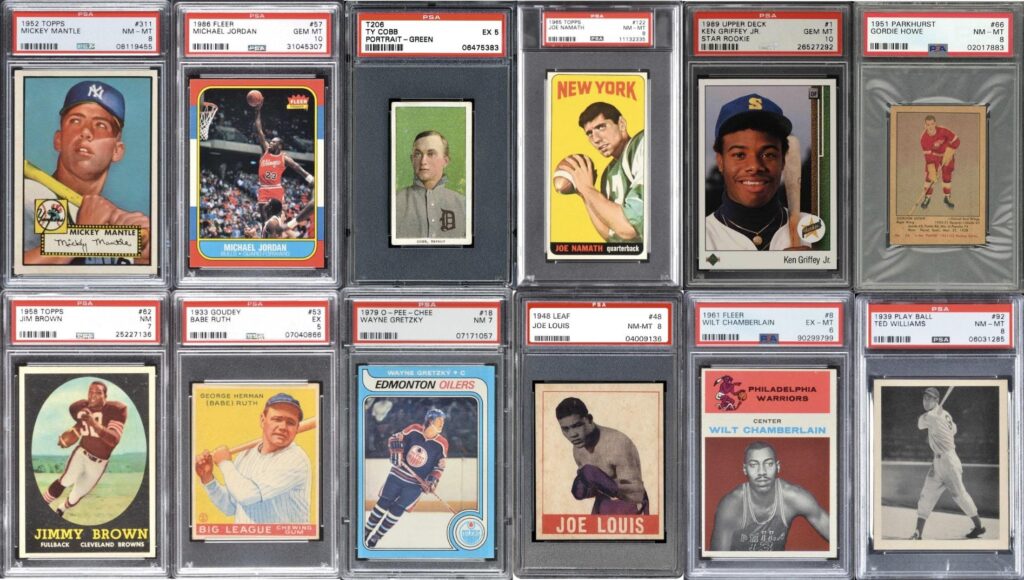Sports card collecting has transformed from a leisure hobby into a significant passion blending history, sports, and economics. At the heart of this pursuit is the concept of card grading. Card grading serves as a vital tool in determining the value, authenticity, and condition of sports cards, making it an indispensable aspect for enthusiasts and investors alike.
The Basics of Sports Card Grading
The process of grading sports cards is an intricate exercise aimed at assessing their condition and verifying authenticity. This practice is essential for any dedicated collector as it substantially influences a card’s market value and desirability. The grading process scrutinizes various elements of the card, including its corners, edges, surface, and centering, to determine its overall condition.
Understanding Card Condition
The condition of a sports card is typically classified within a range from ‘Poor’ to ‘Gem Mint’. Each category follows specific criteria, and the presence of minor defects can dramatically affect the card’s market value. A card in superior condition can command a price several times higher than the same card in a lower grade, underlining the importance of condition in card valuation.
The Grading Process Explained
The journey of professional card grading encompasses multiple steps, starting from an in-depth examination to final encapsulation for protection and preservation. While some collectors opt for do-it-yourself grading methods, professional grading offers a more standardized and universally acknowledged evaluation, crucial for establishing a card’s true market value.
How Grading Affects Card Value
The impact of grading on a card’s value cannot be overstated. High-grade cards often experience a substantial increase in value, making them highly sought after by collectors and investors. This section would explore real-world examples to demonstrate the profound effect of grading on a card’s investment potential.
Major Grading Companies
The sports card grading landscape is dominated by several key players, including PSA, BGS, and SGC. Each of these companies has developed its unique grading standards and enjoys a distinct reputation in the market. The choice of a grading company can significantly influence the perceived and actual value of a sports card.
The Role of Grading in Buying and Selling
In the sports card market, grading plays a critical role both for buyers and sellers. For buyers, a graded card provides a guarantee of its condition, while sellers often achieve higher prices for graded cards. This dual impact of grading influences strategies in both buying and selling, shaping the dynamics of the sports card market. In particular baseball cards have seen a huge market for graded cards.
Grading standards have undergone considerable evolution, adapting to shifts in collecting trends and market demands. A historical perspective on these changes offers valuable insights for collectors, enabling them to make more informed decisions and understand the market’s progression.
Controversies and Challenges in Card Grading
Despite its importance, the card grading industry faces its share of criticisms, ranging from questions of consistency to subjective judgment calls. Addressing these challenges is crucial for maintaining the integrity and credibility of card grading practices.
Future of Card Grading
The future of card grading is poised at an exciting juncture, with technological advancements promising greater precision and consistency. This evolution is expected to seamlessly integrate human expertise with technological innovation, paving the way for a new era in card grading.
Tips for Collectors
For collectors looking to grade their cards, preparation and selecting the right grading company are crucial steps. This section offers practical advice and tips for collectors to navigate the grading process effectively.
Exploring case examples of famous graded cards and their impact stories serves to illustrate the significant influence of grading on both value and collector interest. These examples provide a tangible understanding of the grading process and its outcomes.
Collecting sports cards transcends monetary value, encompassing the emotional connection and personal significance of the hobby. Cultivating a collection that resonates personally is as important as its financial value, emphasizing the multifaceted nature of sports card collecting.
For collectors seeking guidance and community, a plethora of resources exists, ranging from online tools and websites to forums and collector communities. These resources offer invaluable support and information, aiding collectors in their pursuit.
Wrapping up
The art and science of grading sports cards play a pivotal role in the world of collecting. Understanding this process, its impact on value, and the considerations involved is essential for any collector or investor. As the industry evolves, staying informed and engaged will continue to be key for enthusiasts in this dynamic and exciting field.


